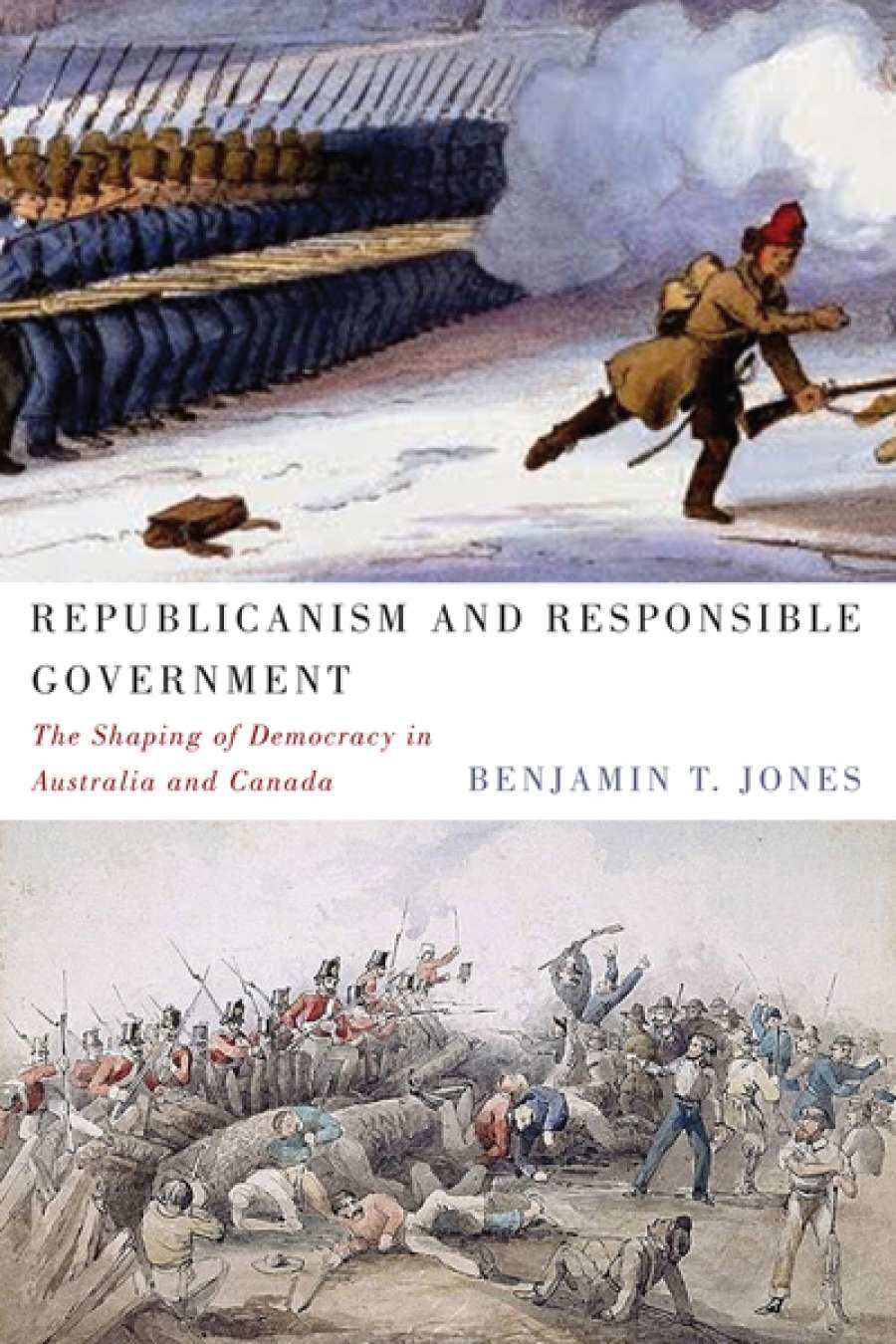
- Free Article: No
- Contents Category: Politics
- Custom Article Title: Ben Huf reviews 'Republicanism and Responsible Government' by Benjamin T. Jones
- Review Article: Yes
- Online Only: No
- Book 1 Title: Republicanism and Responsible Government
- Book 1 Subtitle: The Shaping of Democracy in Australia and Canada
- Book 1 Biblio: McGill-Queen's University Press, US$34.95 pb, 309 pp, 9780773543621
The use of the label 'civic-republicanism' rather than the historically attuned 'civic humanism' or 'classical republicanism', is significant to this book's tenor. The latter two are historically specific concepts developed by historians, most famously J.G.A. Pocock and Quentin Skinner, to excavate a tradition of republicanism prominent in the fifteenth-century Italian city-states and in seventeenth- and eighteenth-century England and America. 'Civic-republicanism', on the other hand, is an extraction from this historiography, fashioned into an attractive normative political theory. This theory is primarily deployed for polemical purposes, offering a critique of contemporary liberalism.
This use of 'civic-republicanism' suggests that Jones is launching his own polemic. Tellingly, the book's target audience is contemporary Australian republicans. It seeks to redress the 'narrow prism' with which they have understood republicanism – that is, a republicanism that simply means disposing of the monarch. Jones and fellow historian Mark McKenna recently edited a collection of essays by Australian republicans, Project Republic (2013), keeping the republican cause alight. Jones's contribution argued that republican ideas have already played a significant role in Australia's political heritage; disposing of the monarch would simply be an official acknowledgment of this. Republicanism and Responsible Government, clearly a further intervention into the republican debates, provides a sustained historical grounding to that argument.
Jones uses the normative theory as a heuristic device to illuminate the presence of 'civic-republican' ideas among democratic reformers in colonial Canada and Australia. To be sure, these reformers did not label themselves 'republicans', and Jones reassures readers he is not rebranding them as such. Conversely, it is argued that the history of colonial civic-republicanism has been 'lost' because the term was a pejorative in the British lexicon following the events of the 1790s, when republicanism became associated with revolution. Brandished by Tories against adversaries, colonial reformers refrained from using the term and identified as 'liberals'. Yet civic-republican ideas, Jones asserts, nevertheless persisted throughout the British world. Historians have over-emphasised liberal influences because the historical record is misleadingly saturated with this loaded term.
 Benjamin T. Jones
Benjamin T. Jones
Reading the period this way enables Jones to unearth an abundance of civic-republican ideas triggering key moments of democratic agitation. The book revisits a series of these moments episodically, giving a sense of the pervasiveness of this political creed across the Empire. Canada's rebellions of 1837–38 and Joseph Howe's campaign for responsible government in Nova Scotia (the first colony to achieve this, in 1848) are re-read as attacks on the self-interested 'corruption' of colonial oligarchs. The Durham Report, written in response to the rebellions, provided a pan-imperial blueprint for a patriotic, virtuous, self-ruling British Empire, celebrated by reformers in both Canada and Australia. The writings of radical Nonconformist minister, John Dunmore Lang, and the 1850s anti-transportation movement in the eastern Australian colonies, expressed a desire to create societies of 'virtuous citizens'. In each case, we are told, reformers pursued a collectivist 'common good', rather than individual interests. These are fruitful re-readings sure to prompt further revision of these events.
The treatment of the Eureka rebellion, an event closely associated with the triumph of male suffrage in colonial Victoria, typifies the interpretations presented in this book. When the Ballarat Reform League composed its manifesto protesting against mining licences on the eve of the rebellion, it married the language of rights with civic-republican ing imperial 'loyalty'.
Two contributions may prove especially significant. The identification of a civic-republican heritage in Australia, however imprecise at this stage, might help break down assumptions about the hegemony of liberal-individualism in Australia's political culture. It may provide new scope to explain collectivist elements that became so prominent later in nineteenth-century Australian politics, especially trade union conflict but also the innovative social reforms around Federation. The book might also provide a richer intellectual dimension to Australia's republican debates, which may be primed for new life under a republican prime minister. More than just symbolic regicide, Jones invites readers to reflect on the broader meaning of republicanism, many features of which have already shaped our history.


Comments powered by CComment